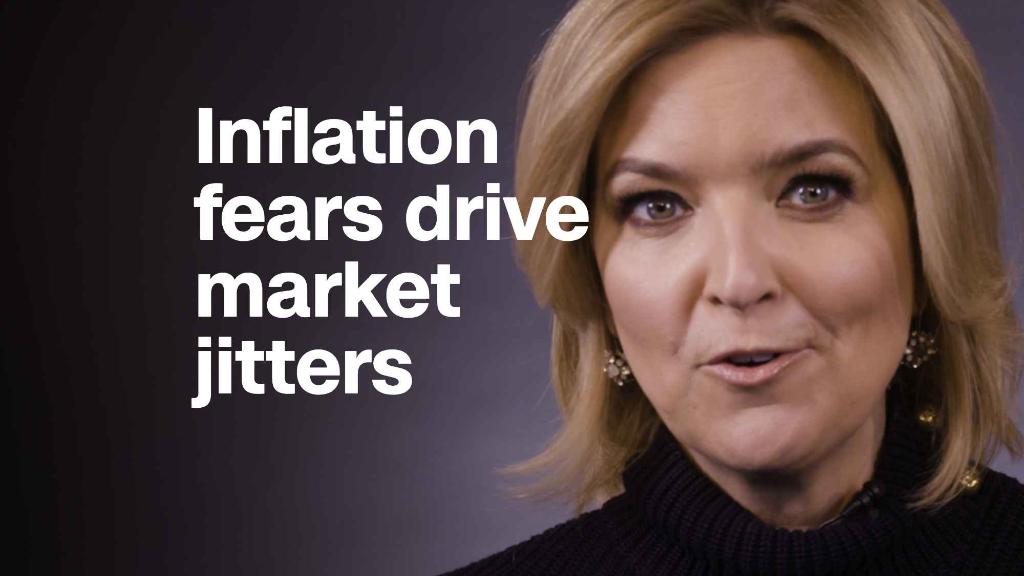
For the second time this week, the Dow plunged more than 1,000 points.
And the stock market is now in a correction -- 10% off its record high just two weeks ago.
Fears about the bond market, inflation and interest rates seized investors again Thursday and drove the Dow, the S&P 500 and the Nasdaq all into the red for the year.
The Dow finished with a decline of 1,033 points, the second-worst point drop in history, eclipsed only by Monday's 1,175-point nosedive.
The percentage decline on Thursday, 4.2%, wasn't nearly as bad as the scary days of the 2008 financial crisis. But a steady climb that lasted more than a year has given way to two weeks of shaky selling. The Dow is on track for its worst weekly percentage drop since the crisis.
"This is not the end of the world, but it is uncomfortable," said Rich Guerrini, CEO of PNC Investments.
The economy is strong, but investors are worried about inflation, and the possibility that the Federal Reserve will raise interest rates faster than expected to fight it. The 10-year Treasury yield briefly hit a four-year high of 2.88%. The bond market is a decent indicator of fears about inflation.
"The bond market has definitely got the stock market's attention," said Ryan Detrick, senior market strategist at LPL Financial. "Is the bond market telling us something we don't know? Is there more inflation down the road than we're expecting?"
Related: Trump breaks his silence on market chaos
The Dow closed below 24,000 for the first time since late November. The Nasdaq ended at a two-month low and just shy of a correction.
Trading has been choppy for days, and the market has swung in wide ranges -- up and down nearly 2,300 points over the past week. Consider this: The S&P 500 has risen or fallen 1% five times in the past two weeks. That only happened eight times all of last year.
And the VIX, a measure of market volatility, is near the highest level since August 2015.
"A big down day like Monday doesn't just go away. We're going to continue to see volatile days," said JJ Kinahan, chief market strategist at TD Ameritrade. "It can take two to three weeks to work through the system."
It's a big shift from 2017 and the beginning of 2018, when the stock market went the longest period ever without tumbling. But such calm is unusual, and stocks overheated.
"We had an epic run. There was euphoria because there hadn't been a pullback," said Jeffrey Schulze, investment strategist at ClearBridge Investments.
Bonds are spooking stocks
The bull market has feasted on extremely low bond rates for years, but those days may be ending.
Investors worry that Treasury yields will rise to levels that make stocks less attractive, and will force the Federal Reserve to fight inflation by aggressively raising interest rates.
New York Federal Reserve President Bill Dudley told Bloomberg News on Thursday that if the U.S. economy keeps getting stronger the central bank may be justified in raising rates four times this year. Wall Street has been expecting three rate hikes at most.
Dudley, who called the market slump "small potatoes," said the "jury is still out" on the number of rate hikes.
Washington is putting more pressure on rates. The U.S. Senate reached a bipartisan deal Wednesday that would boost spending limits by $300 billion over the next two years. The compromise, coupled with Republican tax cuts, could lift the federal budget deficit to $1.07 trillion in fiscal 2019, according to Bank of America estimates.
Wall Street anticipates that more government spending will force the Treasury Department to borrow more money by selling additional bonds. To drum up demand for that higher supply, rates may have to go up.
Related: Trillion-dollar deficits will hit sooner than expected
The stock market is still up dramatically since President Trump's election. His promises for big corporate tax cuts helped lift the Dow more than 8,000 points, though it has since given back about a quarter of that surge.
The market performance also reflects the strong U.S. and global economies, which have boosted corporate profits. The job market remains healthy, as evidenced by a report Thursday that applications for unemployment benefits are at a 45-year low.
"The U.S. economy is on solid foundation," said ClearBridge's Schulze.
--CNNMoney's Donna Borak contributed to this report.


